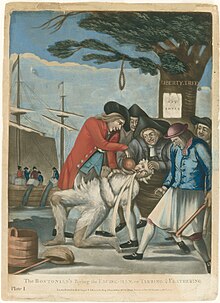Tars and feathers

Taring and feathering is a method of punishment , torture or vigilante justice . Alleged or actual criminals were coated with tar or rolled in tar, pelted with feathers and then mostly abandoned. Tarring and feathering makes the condemned visually outlaw . The tar used is not the bitumen commonly used today , which is now used as asphalt in road construction with aggregates , but wood tar . This is viscous when unheated; taring the victim did not cause burns .
The widespread expression of “tar and feather”, which goes back to the old custom, is used in a metaphorical way as a threat to torture someone as a punishment and to permanently expose them. The punishment has been known since ancient times and was particularly common in the United States in the 19th century.
After the re-establishment of the Ku Klux Klan in 1915, this form of lynching experienced a resurgence in the United States. According to the authors David Mark Chalmers ( Hooded Americanism , 1965) and William Peirce Randel ( Ku Klux Klan , 1965), so-called tar-and-feather parties were among the instruments of intimidation and torture of unpopular people that were widely used in the 1920s. According to the political scientist Wolf-Rüdiger Wersich , this type of seemingly archaic punishment was still being used in individual cases in the 1960s .
The torture method of tar and feathering was processed literarily by Edgar Allan Poe in the story The System of Dr. Tarr and Professor Fether and by Mark Twain in the Adventures of Huckleberry Finn . In the comics of the Lucky Luke series, taring and feathering often appears with an ironic undertone as a punishment for cardsharps and other fraudsters.
Web links
Individual evidence
- ^ Wolf-Rüdiger Wersich : Contemporary right-wing extremism in the United States. 1984